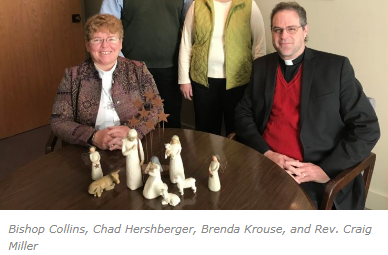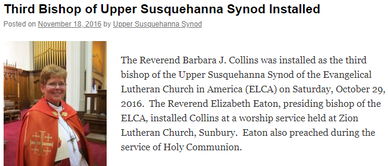|
Many in Christendom including most Lutheran denominations believe the Bible, written by God, is inerrant, or "free from error." Dr. Albert Mohler, Jr. says, "The affirmation of biblical inerrancy means nothing more, and nothing less, than this: When the Bible speaks, God speaks.” That is not the case with the Evangelical Lutheran Church in America (ELCA). Why not? And what does the ELCA believe about the Bible?
“We believe that the Scripture are the inspired word of God. But they are not inerrant because human beings are in error. You ever read one part of Scripture and then read something else and they don’t match?” (listen here, at the 58:10 minute mark)  At the same meeting, Rev. Craig Miller, Assistant to the Bishop of the Upper Susquehanna Synod, gave the following disturbing responses to questions from St. Luke Lutheran Church members: Question: “Do you believe that the writers of the Bible were so controlled by the Holy Spirit that they wrote exactly what God wanted them to write?” Rev. Craig Miller: “No. No.” Question: “You don’t believe that the writers of the Bible wrote what God wanted them to write?” Rev. Craig Miller: “Letter by letter? In the form that we have it? No. These have been copied over and over again and there have been mistakes that have been made.” Question: “So the Bible is full of mistakes and contradictions?” Rev. Craig Miller: “Certainly, there have been copy errors and yes, if you are only reading the Bible literally, then yes there are contradictions.” (listen at the 1:05:25 minute mark here) The ELCA states the following about the Bible, "This church accepts the canonical Scriptures of the Old and New Testaments as the inspired Word of God and the authoritative source and norm of its proclamation, faith, and life" (Art. 2.03 of the Constitution of the ELCA). The ELCA does not call Scriptures inerrant. ELCA Rev. Jay Thorson said this, in the ELCA magazine Living Lutheran, about God's Word, "I was reclaiming the view that the Bible isn’t an inerrant oracle dropped from heaven but more like a messy, earthen vessel holding the treasure of the saving gospel message. That’s what most ELCA professors and pastors teach, and I realized that was where I belonged." (See here) ELCA pastor Jerry O'Neal similarly writes, "To those who say, 'But you don’t believe in the Bible?' No, I don’t. As our former presiding bishop, Mark Hanson, once said, 'I don’t believe in the Bible – I believe in the God revealed in the Bible.' The Bible is NOT inerrant. It contains clear contradictions in places (e.g. 2 creation stories in Gen. 1—3 that do not agree), and it has been open to interpretation from the beginning." (see here) Popular and helpful website gotquestions.org writes this about the Evangelical Lutheran Church in America, "It claims to hold to the authority of Scripture, but it rejects inerrancy." (See here) The ELCA's belief about Scripture is a major problem. It has allowed heresy to take hold in the denomination. (As I document on this website). The most popular ELCA pastor, Nadia Bolz-Weber, whom the ELCA adores and had as a keynote speaker to address 31,000 ELCA teenagers this summer, says the following about God's Word: - “We should never be more loyal to an idea or an interpretation of a Bible verse than we are to people..." (See here) - "This is where it’s very convenient to be a Lutheran, because Lutherans very admittedly have a canon within the canon. So not all Scripture is the same to us. The Gospel of Jesus, the good news of who Jesus is, whether those texts are found in the Old Testament or the New, is at the very center of our understanding of why the Bible even exists. The Bible is the cradle that holds Christ. The cradle’s not Christ. If you understand that that is the importance of the Bible, then suddenly Scripture is read in concentric circles around what it is at its center. Sometimes you read Paul, and it’s the most beautiful thing you’ve ever read. I actually can feel it in my body. I’ll read something gorgeous from Paul, and just be like, 'That’s breathtaking. That is the word of God. That is the word of God. There’s something eternal about what he’s saying.' And then other times you read Paul and you’re like, 'Good lord, what is that?'" - (See here) - “The Bible is not God. The Bible is simply the cradle that holds Christ. Anything in the Bible that doesn't hold up to the gospel of Jesus Christ simply doesn't have the same authority.” (See here. Video looks to be removed) - “...Preaching hopefully in some way is the word of God, speaking is not. So I thought, I wonder, we can look at Paul that way. You know like sometimes he was just going off on his snotty opinions, he has some authority to speak on it but that’s not necessarily the Word of God.” (Listen to the audio posted here) - "The Bible’s not clear about shit!" (see here) (apologies for the language) This view, as you have read, is much different than how of our Lord and Savior, Jesus Christ viewed Scripture. He view it as authoritative, as truth, as from God. (See here) The namesake of Lutherans, Martin Luther, also stands against the ELCA belief about Scripture, saying the following about the Bible,
“Over against all the statements of the fathers and of all men, yes, over against words of angels and devils, I place the scriptures” (p. 80) And, “I have learned to ascribe the honor of infallibility only to those books that are accepted as canonical. I am profoundly convinced that none of these writers have erred” (p. 78). A review of Luther and the Bible, by Willem Jan Kooiman, translated by John Schmidt (Muhlenberg Press. 1961.) What one believes about the Bible is significant. The ELCA conducted a study in 1991, and one of its findings was that pastors who believe the Bible is inerrant were less likely to support abortion, homosexuality, and the belief that "men keep women down because most men benefit from having more power." (See here) How do you think the ELCA's view of God's Word has affected the ELCA's stance on transgenderism, sexual morals, the state of Israel, the reality of hell, salvation, seeking converts, the validity of other religions, miracles in the Bible and God's account of creation?
1 Comment
Stephen Hedlund
2/4/2019 10:10:18 am
It had been taught among us (“us” Christians, that is) that creation is a revelation of God, a “general revelation,” that is, a revelation intended for all and that may be perceived by all directly, without an intermediary. It had also been taught among us that redemption is another revelation of God, a “special revelation,” that is, a revelation intended for all but that may be perceived only through an intermediary, and the intermediary is Jesus Christ. (It had also been taught among us that Israel was called upon to point forward toward (to be a testament to) the coming of the Intermediary and that the church was called to attest to (be a testament to) the completed work of the Intermediary.) It had further been taught among us that the law (our purpose) is revealed both generally (through the God-implanted conscience) as “the law written on the heart,” and revealed specially (through the Ten Commandments) as “the law written on stone.” The revelation on stone confirms the revelation in the heart. It’s all about revelation. Even the secular world understands and refers to Christianity as being committed to “revealed religion.”
Reply
Your comment will be posted after it is approved.
Leave a Reply. |
Prove all things; hold fast that which is good.
1 Thessalonians 5:21 Dan Skogen
Former ELCA seminary student and former ELCA member who is fed up with the ELCA's consistent mockery of God's Word. If you have been helped and blessed by Exposing the ELCA's ministry, please help us continue to proclaim the truth of God's Word to ELCA members who need to hear it.
Give online by clicking the "donate" button below: Categories
All
Archives
July 2024
Have nothing to do with the fruitless deeds of darkness, but rather expose them. - Ephesians 5:11
|

 RSS Feed
RSS Feed

